C r e a t i n g N e w H i s t o r y
T h e W o r k
T h e W o r k
T h e W o r k
Into Action
photo caption
Armored bus used by Jewish civilians. Arab raiders had no qualms about murdering unarmed civilians including children.
Photograph courtesy of Imperial War Museum.
The small force was organized and armed at three Jewish settlements in northern Palestine. The bases became Ein Harod, Hanita, and Ayyelot Hashashar (soon moved to Aifikim). Eventually five posts were established to cover the Galilee and Jezreel Valley region where they would operate. Wingate set up force headquarters at the settlement at Ein Harod, near the pipeline and between the town of Afula and the Jordan River. Initially, seventy-five members of the Haganah complemented forty British soldiers.1 Three platoons were created comprising a squad of British soldiers and two more squads of several dozen of Jewish volunteers. In command of each was a British officer with senior British NCO. Brigadier Evetts fully supported him, stating "You chase them by night and I'll chase them by day."2 He supplied Wingate with good personal, the three officers being lieutenants Bela Ben-Bredin, Michael Grove & Rex King-Clark. When Lieutenant Bredin volunteered he had little idea of what was expected. He remembered how, "we got to this place [Ein Herod], we got there early, half an hour before the time that I mentioned, and when we stopped a rather untidy looking officer came out from behind a hedge and said, "You're late. All right, follow behind my car." That was my first meeting with Captain Orde Wingate."4
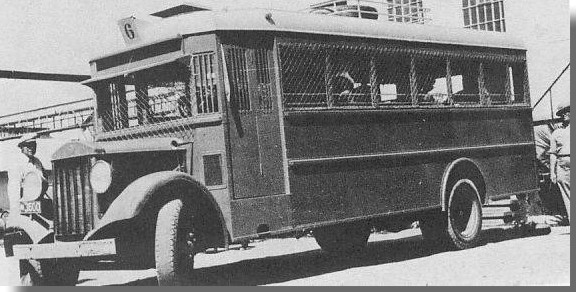
 Wingate sought out volunteers from among the Haganah Ghaffir men. He encouraged them to overcome all doubts they had about making good soldiers, telling them "The most important characteristic of a soldier is not his body, but his brains and his will power." 5 Many remember Wingate opening his training introductory remarks with the words, "Our purpose here is to found the Jewish army."6 The Jewish soldiers (some of them veterans of foreign armies themselves) were quickly trained in basic military skills and fieldcraft by the British soldiers in less than a week, the Haganah already having some military training and leadership. The training continued into live patrols, with after a matter of weeks of these the Ghaffir men were considered trained. The 3 British officers themselves found Wingate's night battle drill a new concept. Overseeing and leading them in the rapid training was Wingate, who was hard but very professional, all three officers receiving harsh criticism if he felt it was needed.
Wingate sought out volunteers from among the Haganah Ghaffir men. He encouraged them to overcome all doubts they had about making good soldiers, telling them "The most important characteristic of a soldier is not his body, but his brains and his will power." 5 Many remember Wingate opening his training introductory remarks with the words, "Our purpose here is to found the Jewish army."6 The Jewish soldiers (some of them veterans of foreign armies themselves) were quickly trained in basic military skills and fieldcraft by the British soldiers in less than a week, the Haganah already having some military training and leadership. The training continued into live patrols, with after a matter of weeks of these the Ghaffir men were considered trained. The 3 British officers themselves found Wingate's night battle drill a new concept. Overseeing and leading them in the rapid training was Wingate, who was hard but very professional, all three officers receiving harsh criticism if he felt it was needed.
During this period Wingate began feel he was on a special mission. He wrote to his wife that he believed "no great man could be happy," and that suffering in life gave it meaning.7 His officers were noticing this too, in the form of being driven to overcome all obstacles. Bredin shared living quarters with him and noticed that, "We would come in perhaps from three or four days out in the hills, marching hard all night and lying up in hidden places by day, and we'd all come back to Ein Herod and all most of us wanted was a good drink, a bath and lot of sleep. But he didn't. This dynamo which buzzed inside him kept him going."8
photo caption
An SNS patrol setting out. A mix of military & civilian uniforms was worn and footwear was light, rubber-soled canvas shoes.
Photograph courtesy of Her Majesty's Stationary Office, U.K.
photo caption
Members of kibbutz Hadera with British soldiers of the SNS. Wingate's physical demands included being able to patrol long distances and fight at any time: "A squad which does not march 15 miles across country per night is not doing its duty or exerting its proper effect."30
Photo courtesy of the
Israel Haganah Museum
Skirmishes Across the Galilee

 The first patrols of the Special Night Squad started going out at night the beginning of June. Every night patrols would to go out, consisting anywhere from one to two mixed squads (8 to 20 men) of British and Haganah. They would patrol for long hours over several dozen kilometers operating in the territory the rebels were, setting ambushes near hostile Arab villages, at border crossing points, by the pipeline. They marched with two men out as scouts, with the main body over a dozen yards behind. Often Wingate or his officers would often take a scout position. Crossing and re-crossing their pathway, zigzagging and sweeping an area, they would return by daylight or after a full day out. On the 3rd the SNS experienced its first engagement. A group of Arab saboteurs was surprised by Bredin's unit near the pipeline and shots were exchanged. In a second incident the action was quick and the Arab guerilla group was captured or killed. Throughout June, patrols continued and expanded in their range, bringing success. In a July report Wingate pointed out that while previously the pipeline had been attached several times a week, by June 14th it had been punctured once only. A retaliatory raid against the rebels in the village of Jordiah resulted in a local truce being proposed by that village, Hanita never being threatened again.
The first patrols of the Special Night Squad started going out at night the beginning of June. Every night patrols would to go out, consisting anywhere from one to two mixed squads (8 to 20 men) of British and Haganah. They would patrol for long hours over several dozen kilometers operating in the territory the rebels were, setting ambushes near hostile Arab villages, at border crossing points, by the pipeline. They marched with two men out as scouts, with the main body over a dozen yards behind. Often Wingate or his officers would often take a scout position. Crossing and re-crossing their pathway, zigzagging and sweeping an area, they would return by daylight or after a full day out. On the 3rd the SNS experienced its first engagement. A group of Arab saboteurs was surprised by Bredin's unit near the pipeline and shots were exchanged. In a second incident the action was quick and the Arab guerilla group was captured or killed. Throughout June, patrols continued and expanded in their range, bringing success. In a July report Wingate pointed out that while previously the pipeline had been attached several times a week, by June 14th it had been punctured once only. A retaliatory raid against the rebels in the village of Jordiah resulted in a local truce being proposed by that village, Hanita never being threatened again.
Wingate worked to be clever and intelligent with his tactics. The movements of the guerillas inside Palestine, as well as their bases, and infiltrators coming across the border were tracked, or their intentions were ascertained. Intelligence was coming from Jewish communities and Arab sources, as well as from British sources. Officially his actions were under the command of Brigadier Evetts stationed in Nazareth, unofficially he coordinated his actions with the Haganah via a special Haganah liaison officer. The SNS men would slip out as individuals at dusk and assemble one-by-one. Zigzagging across paths and choosing different return routes from missions were some standards set to help avoid ambushes. Other times, knowing informants among the civilians would be watching while moving through Arab areas, he taught his men to jump of their vehicles during movements at night while the drivers were instructed to keep driving. The men would hide in ditches until the convoys passed and then assemble for action. The convoys would continue on tracked by the Arabs, unaware the vehicles were empty.
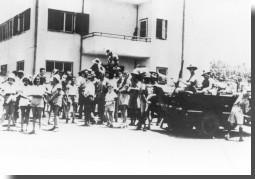
 To Wingate success came from a thought-out plan depending upon surprise, quickness and intense violence. The SNS was operating not just near the pipeline but also in nighttime mobile patrols near Arab villages. Wingate told his men that, "We are the best night fighters and the Arabs are scared stiff of the night."9 Wingate believed in nighttime moving ambushes, feeling a squad when moving out is likely to be revealed by its tracks from local civilians. And he reasoned a moving ambush would lead to greater surprise of rebel gangs both on the move and at rest. This would also reduce their ability to terrorize villagers into acquiescence. He believed that if surprised and facing a determined charge, the Arab marauders who lacked professional training would be unable to stand up to a well-led and trained force, panicking quickly. Thus for his men he specified they initially rely upon for surprise and close-quarter action the bayonet and grenade, backed up by
pistols and machine-guns.
To Wingate success came from a thought-out plan depending upon surprise, quickness and intense violence. The SNS was operating not just near the pipeline but also in nighttime mobile patrols near Arab villages. Wingate told his men that, "We are the best night fighters and the Arabs are scared stiff of the night."9 Wingate believed in nighttime moving ambushes, feeling a squad when moving out is likely to be revealed by its tracks from local civilians. And he reasoned a moving ambush would lead to greater surprise of rebel gangs both on the move and at rest. This would also reduce their ability to terrorize villagers into acquiescence. He believed that if surprised and facing a determined charge, the Arab marauders who lacked professional training would be unable to stand up to a well-led and trained force, panicking quickly. Thus for his men he specified they initially rely upon for surprise and close-quarter action the bayonet and grenade, backed up by
pistols and machine-guns.
photo caption
The dining hall at Ein Harod. Dayan once observed that upon return to the base from a mission the men worked to prepare breakfast, while Wingate sat in a corner naked and read the Bible, munching on raw onions.
photo courtesy of the
Israel Government
Press Office
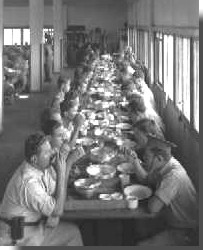 Initially the audacity in his belief that he alone could teach the Haganah to fight and win led some in the Haganah to view him as "mad and maddening."10 On operations he often took one of the positions of forward scout, leading patrols himself. During these he took to wearing an old-style military pith helmet. Cultivating a
casual appearance,
Wingate prioritized nothing but the highest performance on the battlefield, demanding the highest standard. Not concerned with being well turned-out, practically his only concern during inspections before a mission was on the necessity of keeping the weapons clean. At their bases, a casual and relaxed democratic-like atmosphere was maintained, true to the Jewish kibbutzim and early pioneering spirit. Relaxing on a hot day in his hut with Bredin, he preferred a brush to a shower to cool down. One SNS man recalled later that though Wingate was the sloppiest British officer he had every seen, "Whereas most of the time and effort in the British army units were devoted to ceremonial matters such as parades, dress, and appearance, none of these existed in the Special Night Squads. Anything not directly related to the actual fighting did not exist. When we went out on an operation, our dress and equipment were suited to the task at hand, and while in camp we wore whatever we wanted to."13
Initially the audacity in his belief that he alone could teach the Haganah to fight and win led some in the Haganah to view him as "mad and maddening."10 On operations he often took one of the positions of forward scout, leading patrols himself. During these he took to wearing an old-style military pith helmet. Cultivating a
casual appearance,
Wingate prioritized nothing but the highest performance on the battlefield, demanding the highest standard. Not concerned with being well turned-out, practically his only concern during inspections before a mission was on the necessity of keeping the weapons clean. At their bases, a casual and relaxed democratic-like atmosphere was maintained, true to the Jewish kibbutzim and early pioneering spirit. Relaxing on a hot day in his hut with Bredin, he preferred a brush to a shower to cool down. One SNS man recalled later that though Wingate was the sloppiest British officer he had every seen, "Whereas most of the time and effort in the British army units were devoted to ceremonial matters such as parades, dress, and appearance, none of these existed in the Special Night Squads. Anything not directly related to the actual fighting did not exist. When we went out on an operation, our dress and equipment were suited to the task at hand, and while in camp we wore whatever we wanted to."13
Whenever large-scale operations or coverage was needed in the Upper or Lower Galilee, the SNS worked with the Haganah's new mobile units, the Fo'sh companies. Moshe Dayan was a young leader in one of the Fo'sh companies, and he worked often with Wingate's SNS. They had first met in early 1938 when Wingate journeyed with a pistol & bible to Shimron settlement where Dayan was temporarily stationed. "I recall that he arrived just before sunset, and the fading light lent an air of mystery and drama to his coming. The drama heightened as the evening progressed, right up to the unorthodox climax."14 Dayan invited him to give a lecture on his ideas of mobile ambushes. Wingate did, then announced to the shock of the Haganah men to demonstrate his words he would lead them nighttime ambush to a nearby Arab village. Not satisfied with the pace set by the lead scout, he placed himself at the front. Though no contact was made, his navigation skills and strength of will to overcome his physical pain impressed Dayan, removing his doubts about this British officer.
photo caption
Moshe Dayan, Yitzhak Sadeh, and Yigal Allon. Two young leaders serving in the Haganah Police who worked with the SNS experimenting with more aggressive tactics were Yigal Allon and Moshe Dayan, both of whom rose to more prominent positions.
Photo courtesy of the
Kibbutz Hanita, Israel
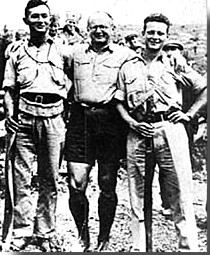
 Working together in military actions, Dayan learning much from Wingate. The two men became friends. Dayan respected Wingate for his military professionalism and audacity, learning about retaliatory raids to ambushes to deception. To receive praise from Wingate was a moment of excitement. Dayan wrote in a letter after one action that, "Everybody thinks our action was quite good. Captain Wingate praised our operation and we may be getting a citation. After all, we were just seven and there were eighty of them. Our boys behaved wonderfully."15 Quite a compliment from the man who had Hanita had said, "I know how to wage war and you don't."16 Reflecting later on, Dayan wrote, "As for military matters, I thought him a genius, an innovator and non-conformist."17 And he remembered that, "Wingate was not physically robust.. There were times when he reached the edge of exhaustion, and I thought he would collapse. But he would march on, driven by an iron will. He had an unshakable belief in the Bible. Before going on an action he would read the passage in the Bible relating to the places where we would be operating and finding testimony to our victory - the victory of God & the Jews."18
Working together in military actions, Dayan learning much from Wingate. The two men became friends. Dayan respected Wingate for his military professionalism and audacity, learning about retaliatory raids to ambushes to deception. To receive praise from Wingate was a moment of excitement. Dayan wrote in a letter after one action that, "Everybody thinks our action was quite good. Captain Wingate praised our operation and we may be getting a citation. After all, we were just seven and there were eighty of them. Our boys behaved wonderfully."15 Quite a compliment from the man who had Hanita had said, "I know how to wage war and you don't."16 Reflecting later on, Dayan wrote, "As for military matters, I thought him a genius, an innovator and non-conformist."17 And he remembered that, "Wingate was not physically robust.. There were times when he reached the edge of exhaustion, and I thought he would collapse. But he would march on, driven by an iron will. He had an unshakable belief in the Bible. Before going on an action he would read the passage in the Bible relating to the places where we would be operating and finding testimony to our victory - the victory of God & the Jews."18
Innovative and aggressive ideas impressed the Haganah men, taking root as patrols and raids continued with success. Initially the Haganah men had, "an inner lack of confidence in their soldierly ability."19 When Wingate first began patrols many Haganah men were cautious, not fully trusting him. And there was cynicism toward any British willingness to work with them. Under Wingate's leadership, his skillful training, and with success on the battlefield, this started to change. This quickly changed into respect and admiration for his professionalism and motives. As the Haganah men found success and knowledge, one would later recall that, "Wingate was almost hypnotizing us, and when we went after him we were filled with confidence, such that we could not receive from anyone else."20 With the success of his methods he picked up the nickname "The Lawrence of Judea," in reference to his famous relative.
He was also making an impression upon the British regulars. With his efficiency and devotion to detail, he earned the professional respect among his three younger British officers. Upon the regular enlisted soldier, who while amused by the unique sloppiness of their commanding officer, the impression was a respectful one too. As one sergeant said, "He was a fine chap. He knew what he was doing, knew what he wanted and knew how to get it. He stuck up for us very well too."23 Said Bredin, "There is no doubt that Wingate caught the imagination of the British soldiers who served under him at this time. They regarded him as more or less round the bend, but deserving of great respect for his courage, his energy, his undoubted brains, and the fact no obstacle ever deterred him."24 As the summer progressed, quick & sharp engagements started to became regular. Within a month, by the end of June the SNS had engaged in about 10 engagements with some 60 kills.25
photo caption
Arab guerilla is disarmed after an action in 1938. An attempt by Wingate to emulate Gideon by acquiring rams horns as trumpets (like Joshua at Jericho) for psycho-
logical warfare however came to naught.
Photo courtesy of the
Israel Government
Press Office
The Largest Battle
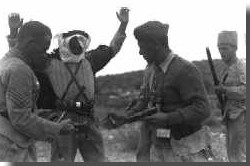
 The biggest engagement the SNS would face took place in July, one which King-Clark who participated labeled "a cock-up of the first water."26 On the 5th, a small SNS patrol of 9 men led by Lieutenant Bredin discovered & aggressively attacked a larger Arab force of close to 100.27 The larger Arab force was put to rout, and a flanking patrol led by Wingate engaged them as they retreated. The regional Arab guerilla leader assembled his force for a response to this, and the town of Nazareth was attacked. Afterwards the force gathered in secret nearby, near the village of Dabburiya, 5 miles east of Nazareth at the southern foot of Mount Tabor. From intelligence it was believed that this force was in the area between Dabburiya and the nearby village of Ein Mahil to its north. Wingate decided to concentrate his force and strike before the enemy force attacked again. But he assumed they were concentrated at Ein Mahil.
The biggest engagement the SNS would face took place in July, one which King-Clark who participated labeled "a cock-up of the first water."26 On the 5th, a small SNS patrol of 9 men led by Lieutenant Bredin discovered & aggressively attacked a larger Arab force of close to 100.27 The larger Arab force was put to rout, and a flanking patrol led by Wingate engaged them as they retreated. The regional Arab guerilla leader assembled his force for a response to this, and the town of Nazareth was attacked. Afterwards the force gathered in secret nearby, near the village of Dabburiya, 5 miles east of Nazareth at the southern foot of Mount Tabor. From intelligence it was believed that this force was in the area between Dabburiya and the nearby village of Ein Mahil to its north. Wingate decided to concentrate his force and strike before the enemy force attacked again. But he assumed they were concentrated at Ein Mahil.
In darkness in the early morning of July 11th Wingate lead half the strength of the SNS in, approaching in a loose ring of several groupsaround Ein Mahil. The plan was to surround the village during the night and while one force advanced to flush out the enemy, other units would await in ambush. Discovering that the enemy was not there, Wingate sent the force southward to Dabburiya. The section led by Grove approaching Dabburiya from the east ran into hostile forces, surprise was lost and the larger Arab force now was fully alert. Wingate led his group south to the village. Sweeping in from the west, another assault force led by Lieutenant King-Clark and his sergeant rushed in, exchanging fire with the rebels. Wingate arrived from the north with more men and combat flared around the village. In the dark and confused fighting the guerillas began to scatter. Wingate took some men to pursue some of the rebels who were retreating back up a hillside on the north side of Dabburiya. One SNS team around a machine-gun remained on the western side of the town to provide covering fire for his group. A few rebels caught between the two forces opened fire, Wingate's squad returning it. In the darkness and in the line of fire, Wingate's group was mistaken for the enemy by the men of the team manning the machine-gun. Opening fire, they killed one and wounding three other SNS men, among them Wingate. He managed to remain in command till daybreak to King-Clark and Bredin had confirmed that the Arabs had fled in disorder, and that the wounded were being tended to. At the cost of 2 dead, the SNS inflicted at least 9 dead, although as King-Clark said, "How many were gangsters & how many were just villagers who got in the way, I don't know."28
photo caption
Wingate interrogating Arab villagers in July of 1938. His return to action soon after Dabburiya meant his leg wounds took longer to heal, creating much discomfort for him on grueling climbs. One of his officers commented to another about this stating that, "It's not his legs that cope with it, it's his mind."31
Photo courtesy of the
Imperial War Museum,
London
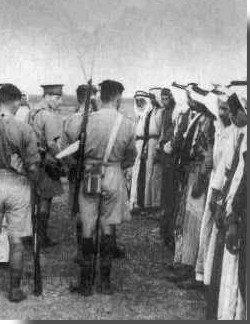 For the rest of July the pipeline was not attacked. Operations continued, and in a few weeks Wingate returned to begin leading patrols though still in pain. The physical and mental demands of wartime patrolling never slackened. The day-long patrols for each of the three platoons were constant, often with only chance determining contact. The days were hot and cloudless, the nights bringing a clear sky with a myriad of bright stars, aiding in navigation. Men would try to move silently cross-country in single file, over trackless stony and hill ground. As King-Clark put it, "I shall never forget the endless stones, large and small, covering, it seemed, every inch of Galilee ground, and making going so tiring and frustrating. And all the squad members will, I know, forever remember the huge fields of waist-high thorn, often several hundred yards across, one sometimes hit unawares in the darkness."29
For the rest of July the pipeline was not attacked. Operations continued, and in a few weeks Wingate returned to begin leading patrols though still in pain. The physical and mental demands of wartime patrolling never slackened. The day-long patrols for each of the three platoons were constant, often with only chance determining contact. The days were hot and cloudless, the nights bringing a clear sky with a myriad of bright stars, aiding in navigation. Men would try to move silently cross-country in single file, over trackless stony and hill ground. As King-Clark put it, "I shall never forget the endless stones, large and small, covering, it seemed, every inch of Galilee ground, and making going so tiring and frustrating. And all the squad members will, I know, forever remember the huge fields of waist-high thorn, often several hundred yards across, one sometimes hit unawares in the darkness."29
1. Michael Bar-Zohar, Lionhearts, Heroes of Israel (Tel Aviv: Israeli Defense Forces Publishing House, 1997), 37.
2. Christopher Sykes, Orde Wingate (New York: World Publising Company, 1959), p.149.
3. Rex King-Clark, Free For A Blast (London: Greenville, 1988), 158.
4. Trevor Royle, Orde Wingate (London: Weidenfeld & Nicholson, 1995), 123.
5. Bar-Zohar, 37.
6. Sykes, 175.
7. Royle, 130.
8. Ibid, 131.
9. Shabtai Teveth, Moshe Dayan: The Soldier, The Man, The Legend (Boston: Houghton Mifflin, 1973), 100.
10. Moshe Dayan in Robert Slater, Warrior Statesman: The Life of Moshe Dayan (New York: William Morrow and Co., 1991), 45.
11. Israel Defense Force, Haganah Museum document 198-28.
12. Royle, 113.
13. Brenner in Yosef Eshkol, A Common Soldier (Tel Aviv: Israeli Ministry of Defense, 1993), p.181.
14. Moshe Dayan, Moshe Dayan: Story of My Life (New York: William Morrow & Co., 1976), 45.
15. Slater, 47.
16. Ibid, 47.
17. Teveth, 101.
18. Dayan, 46.
19. Haganah officer quoted in Sykes, 155.
20. Dov Jirmiyahu in Israel Defense Force, Haganah Museum document 26-14.
21. King-Clark, 165.
22. Ibid, 173.
23. Ibid, 165.
24. Bela Ben-Bredin in Israel Defense Force, Haganah Museum document 8-69(2)-26.
25. Eshkol, 143.
26. King-Clark, 189.
27. Sykes, 156.
28. King-Clark, 191.
29. Ibid, 171.
30. Israel Defense Force, Haganah Museum documents 80-69-7.
31. King-Clark, 195.
